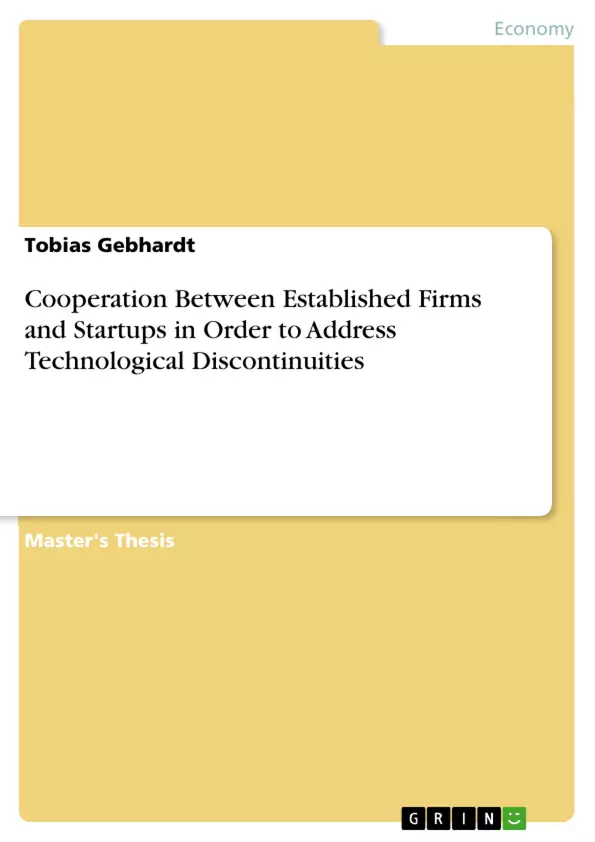Technological discontinuities have been characterizing many markets for several years. Essential drivers for that are the Internet and startups, which make use of this technology in order to create new business models. This progress is quite often challenging established firms and call for them to leave their “comfort zone”. In contradiction to this competitive perspective, this paper aims to highlight the synergies between companies that have already been operating for many years and new market entrants. By doing so, it is examined how both may interact with the aim of commercializing products and sustaining innovation. Thereby, corporate incubators, corporate venture capitalists and non-equity relationships between established firms and startups are considered as forms of cooperation. In addition to that and by using the data of a conducted survey, insights into the experiences and expectations of incumbents and startups will be also provided. Following this, managerial implications shall serve as a base for future cooperation and the management of technological discontinuities.
Inhaltsverzeichnis (Table of Contents)
- 1 INTRODUCTION
- 2 LITERATURE REVIEW
- 2.1 Conditions of incumbents and startups.
- 2.1.1 Challenges of startups.
- 2.1.2 Challenges of incumbent firms
- 2.2 Interfaces between incumbents and startups.
- 2.2.1 Challenges associated with cooperation.....
- 2.2.2 Benefits associated with cooperation..\n
- 2.3 Types of cooperation.
- 2.3.1 Corporate Incubator.
- 2.3.2 Corporate Venture Capital Firms.
- 2.3.3 Non-equity relationship
- 2.1 Conditions of incumbents and startups.
- 3 METHODOLOGY
- 4 RESULTS
- 4.1 Survey of startups.
- 4.2 Survey of incumbents
- 4.3 Limitations...\n
- 5 DISCUSSION.
- 5.1 Managerial Implications
- 6 SUMMARY.
Zielsetzung und Themenschwerpunkte (Objectives and Key Themes)
This paper examines the cooperative relationships between established firms and startups in the context of technological discontinuities. The main objective is to explore how these two types of companies can interact to commercialize products and sustain innovation. The paper focuses on different forms of cooperation, including corporate incubators, corporate venture capitalists, and non-equity relationships. It also provides insights into the experiences and expectations of both incumbents and startups. Key themes of the paper include: * The challenges and opportunities of technological discontinuities for both established firms and startups. * The different forms of cooperation between incumbents and startups. * The benefits and challenges of each type of cooperation. * The managerial implications of these cooperative relationships.Zusammenfassung der Kapitel (Chapter Summaries)
- Chapter 1: Introduction This chapter introduces the concept of technological discontinuities and their impact on established firms and startups. It discusses the challenges faced by incumbents in adapting to these changes and explores the potential for cooperation as a way to overcome these challenges.
- Chapter 2: Literature Review This chapter reviews the existing literature on the relationship between incumbents and startups in the context of technological discontinuities. It explores the challenges and benefits associated with cooperation, as well as different types of cooperative models.
- Chapter 3: Methodology This chapter outlines the methodology used in the study, which includes a survey of startups and incumbents.
- Chapter 4: Results This chapter presents the results of the survey, providing insights into the experiences and expectations of both startups and incumbents regarding cooperation.
- Chapter 5: Discussion This chapter discusses the findings of the study and their managerial implications. It explores the potential for cooperation to foster innovation and address the challenges of technological discontinuities.
Schlüsselwörter (Keywords)
This paper focuses on the key topics of technological discontinuities, corporate innovation, startup ecosystems, and the various forms of cooperation between established firms and startups. The research explores areas such as corporate incubators, corporate venture capital, and non-equity relationships, aiming to provide insights into the dynamics of resource exchange and the challenges and benefits of these interactions.Frequently Asked Questions
What are technological discontinuities?
They are major shifts in technology that disrupt existing markets and business models, often driven by the internet and innovative startups.
Why should established firms and startups cooperate?
Cooperation creates synergies: established firms offer resources and market access, while startups provide agility and disruptive innovation.
What is a Corporate Incubator?
A corporate incubator is a program or facility established by a large firm to support and nurture early-stage startups that align with its strategic goals.
What is Corporate Venture Capital (CVC)?
CVC involves a large corporation making direct equity investments in external startup companies to gain access to new technologies or markets.
What are non-equity relationships?
These are partnerships between firms and startups that do not involve ownership stakes, such as joint development projects or licensing agreements.
- Quote paper
- Tobias Gebhardt (Author), 2014, Cooperation Between Established Firms and Startups in Order to Address Technological Discontinuities, Munich, GRIN Verlag, https://www.grin.com/document/298444



